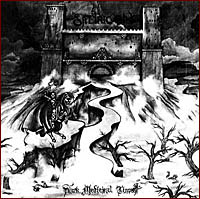SATYRICON (no) - Dark Medieval Times (1993)

Label : Moonfog Productions
Sortie du Scud : 1993
Pays : Norvège
Genre : Black Metal
Type : Album
Playtime : 8 Titres - 44 Mins
Anno 1993. Un vent de révolte et de contestation envers le christianisme souffle dans les provinces du Royaume de Norvège. Le chaos envahit le pays et après les ravages et préjudices causés par la peste dans le même pays en 1349, un néo paganisme se traduit et se renouvelle dans la musique de certains groupes de Metal existants dans le Grand Nord quatorze ans en arrière.
Edifié en 1990 dans les sylves de pins proches de Bergen, SATYRICON en est devenu une des plus crânes références, sorte de porte étendard d’un genre musical qu’ils ont crée à part entière. Leur premier album, Dark Medieval Times, issu de la scène underground norvégienne pose alors les jalons d’un Black Metal médiéval qui influencera pléthore de groupes en devenir. C’est avec ce chef d’œuvre magistral que commença la saga SATYRICON maintenant vu comme un classique du Black Metal norvégien et mondial tant il a su traverser les temps. Volontairement influé par des sujets moyenâgeux, cet opus illustrait à lui seul la magie et la fascination qu’exerçait le Moyen Age sur les deux jeunes gens composant le groupe, Satyr, de son vrai nom Sigurd Wongraven (guitares, basses, chants, claviers) alors avec des cheveux longs et grimé de la tête au pied et son fidèle compère Frost (batterie) qui à l’époque pouvait encore se rendre aux Etats-Unis sans avoir à sourciller.
Employant guitares acoustiques et instruments folkloriques (flûtes), ce qui était assez innovant pour l’époque, SATYRICON enrichit son goût pour le Black Metal folklorique avec des arrangements inédits. Déroutant diront les uns. Féerique et prodigieux crieront la majorité qui se retrouveront au travers de ces mélopées intemporelles.
Portées à bout de bras par ce duo génial, les sept titres de ce Dark Medieval Times incorporaient tous les outils propices pour engendrer un album d’anthologie : des arpèges de toute beauté ornés de guitares brèves et cristallines, des couches de synthés imposantes renforçant les riffs de guitares écorchés, le tout inclut dans des complaintes enchanteresses. Magnifiés par des plans de batterie judicieusement élaborés en parfaite harmonie avec les mouvements tantôt infernaux tantôt hivernaux des arrangements, plusieurs écoutes sont nécessaires pour s’imprégner de l’essence même de l’œuvre.
Riches et solides, les compositions ne souffrent d’aucun défaut et même la production, qui n’était certainement pas la principale préoccupation du groupe à l’époque, rend hommage à des morceaux de toute beauté. De l’intro fougueuse de «Walk The Path Of Sorrow» aux arpèges sibyllins et ésotériques de «Min Hyllest Til Vinterland» nous remémorant l’autre face cachée de Satyr avec WONGRAVEN, son projet personnel, en passant par la pesante et accablante «Taakeslottet», titre limite Doom, les compositions froides, païennes, tonitruantes et parfois turbulentes font de cet album une amorce d’un style encore nouveau et à construire. Pour autant, SATYRICON en avait déjà évalué les principaux usages stylistiques et textuels. Epique, homérique et sublime, cet album légendaire est resté ancré et le restera dans la mémoire collective des fans de Black Metal. Une pièce maîtresse à posséder.
Ajouté : Jeudi 08 Novembre 2007
Chroniqueur : Loki
Score :     
Lien en relation: Satyricon Website
Hits: 13031
|













